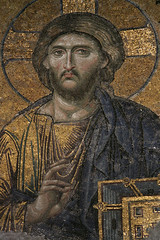Tuesday, April 27, 2010
A Godless Life
Two of the most common questions that atheists’ get asked is “How do you live without Hope?” Or “Why do you want to deny God?” Mostly people just assume that you are ignorant about the Bible and that if only you knew the Good News you would think differently. However, most atheists, I suspect, are not atheists due to lack of exposure to the Bible but for the opposite reason. In fact it is knowledge of the bible that has put me off the God described there and in other similar texts. It is an emotional reaction as much as a rational one. Perhaps one of the reasons for our resistance is that we atheists have trouble with authority figures. Or are we just too critical when, after reading these texts, we decide that if humans have design flaws, whose fault is it anyway?
Perhaps though, we should respond to those questions by asking our own questions: what impact does not believing in a God actually have on your life? What do Atheists do differently than God believers? My answer is simply: nothing. For we are all born, reproduce and die exactly the same regardless of what faith we have. Apparently there are no more atheists in jail than believers. Murders and rapists can believe in a God as well as people who commit fraud and who are unkind to animals or abuse children. Atheists do not seem to be any more immoral or criminal than anyone else. As well, random unpleasant events can happen to us all, atheists or not. We would all die tomorrow if an asteroid hits earth. Believing in God does not stop bad things happening nor does it stop death.
All that seems to happen if you believe, so it seems to me, is that you feel better because instead of random atoms colliding, someone has a purpose or a plan and thinks that you are special. All the wrongs of the world will be righted and in this new Kingdom there will also be everlasting life for believers. Apparently that comforts many people. However it seems unlikely to me and, like most atheists, I prefer to wait and see for myself. But I do have hope that it will not be tomorrow!
Another criticism leveled at atheists this Easter was that, unlike religious organisations, they do not care for the sick, the poor or the under-privileged of this world. This criticism deliberately ignores the many organisations around the world such as the Red Cross, Oxfam and Amnesty International to name just a few, that do not have religious affiliations. It is rather insulting to think that you need to be religious to care about the world or to donate money to worthy causes. Atheists do these things not to please God in order to get into Heaven, but because it is the right thing to do.
Saturday, April 17, 2010
Living with Uncertainty
I chose today’s picture because the red bus atheist campaign in England has been so successful and I like the wording of the banner, particularly the use of the word “probably”. Richard Dawkins (pictured) usually does use this word when saying that in his view there is no God but, perhaps just because of his Oxford manner, gives the impression that really there is no uncertainty at all and that believers are generally just stupid and ill-informed. Of course people who have faith just counter his certainty with their own and accuse atheists of deliberately denying God and leading empty, meaningless lives, which rather leads to a stalemate. This lack of tolerance and understanding of the views of others is obviously a fairly natural psychological result of fears due to lack of control over life and anxieties about strangers. Freud is right I think in encouraging us to continually scrutinize and examine our own motivations and to accept and acknowledge these fears. I think that accepting some uncertainty about the meaning of Life, the Universe and whether a God exists or not, requires a lot of self-confidence or self-control and that we all need to cultivate it to live together more harmoniously.
While I find Atheism to be rationally satisfying, I think that it tends to ignore natural human desires for the irrational and the emotional which belonging to a religion can satisfy, particularly in the area of ritual. Ritual can take the form of ceremonies, stories and celebrations that mark the cycles of life or seasons of the year. Rituals can aid in developing a sense of group values and an idea of shared identity that can allay anxieties and provide comfort in difficult times. Music is, of course, central to ritual as it evokes emotion and creates atmosphere. For some years now I have been celebrating the solstices and the equinoxes as part of what my daughter calls my cult! Although really just an excuse to have a themed party with friends, I really feel that although it is fun, we lack an inherited ritual which is meaningful and emotionally satisfying.
What my historical research has shown however, is that the early Christians used many existing pagan rituals in creating their new religion, so now I can enjoy Easter and Christmas as solar and seasonal festivals without being untrue to my rational beliefs. While I know that we need to be mindful of the fine line between ritual and superstition, and that not everyone shares my world view, I have found that people really enjoy re-connecting with the natural world and becoming more aware of seasonal and celestial events. I think that living, as we mostly do, in urban environments that have very little relation to the natural world and with the decline of participation in meaningful rituals, this might help to explain the increase in depression and anxiety in our modern western world.
Sunday, April 4, 2010
Do we need a Saviour?
As it is Easter, it seems timely to reflect on religion, its role in human society and the near universal need for a savior. In the famous book ‘The Golden Bough’, James Frazer described the transition from magic to myth to religion very persuasively. He examined the origins of European fertility gods and how originally the King was sacrificed at the height of his powers to ensure the return of the sun and the growth of new crops after winter. He was usually re-born again in the spring in a new form. This practice pretty soon gave way to non-human substitutes such as animals and totems. However, it is fascinating to see the survival of such concepts in the continued existence of the Wicker-Man, the phallic may-pole and of course the most famous scapegoat of all, Jesus Christ. However, Frazer’s desire to find a unifying theory of religion caused him to make many dubious assumptions about Non-European indigenous people, their myths and magical ceremonies, leading to much criticism of his work.
It is without question though, that Humans need to belong to a group to survive, and that magic and rituals such as stories, dance or art have always been used to strengthen these bonds, with the unfortunate consequence that outsiders are necessarily excluded. The development of a priestly class, who could intercede on people’s behalf to a God, or Gods, cemented these differences, as their power always depended on the unquestioning acceptance of taboos and on their special knowledge of any rituals or sacred texts. Many modern Christians are scornful about the so called primitive belief in magic yet refuse to recognise that not only does the ceremony of communion when bread and wine are transformed into the body and blood of a sacrificed Christ, but also the concept of resurrection itself, relies on this primitive belief in magic.
Although increased literacy and the translation of sacred texts into common languages have, in most western countries, reduced the power of priests, I believe religion is overall a negative force in society. Many people still believe unquestioningly in texts written in another place and time and continue to uphold taboos relating to food, dress and reproduction which make little sense in the modern world. As we all know, small doctrinal differences can cause violence and all too often, wars. The prevailing view common to nearly all religions is that their particular version of faith is the only and absolute truth and that all other beliefs, however similar, are not only wrong but will lead to eternal damnation. Many are sadly not content to leave this to God but take action in this world to eradicate unbelievers.
Critics of atheism say that secularists too have killed people in the form of Stalinism and other non-religious totalitarian regimes. It is indeed a sad fact that humans tend to want to exterminate others all too freely and that political views as much as religious views have been used to unite people in this way. Also it is true that some Atheists can be as dogmatic and intolerant as anyone else. It is this human desire for certainty and absolutes that leads to trouble in my opinion. However, I can understand why many people want a savior or a hero who will right the wrongs of the world so that we can all live happily ever after but I think we also need to leave room for a little doubt and skepticism, no matter what our world view is. Perhaps we should all celebrate uncertainty as well as fertility at Easter, as that way no one has to die unnecessarily!
Subscribe to:
Posts (Atom)




